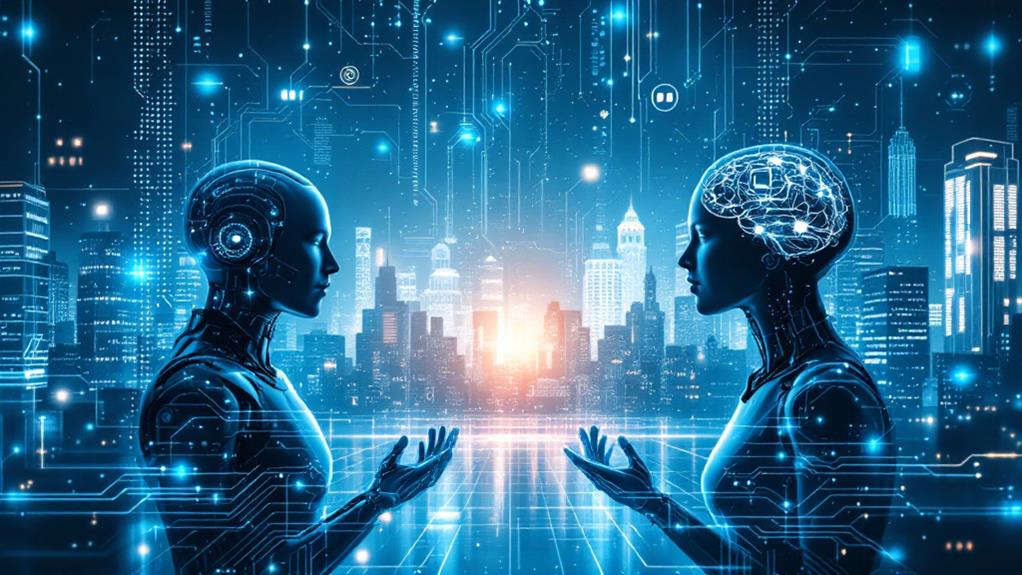Artificial Intelligence Book Review: The Best Reads on AI

You'll find a wealth of knowledge on artificial intelligence in these top-rated books. They cover everything from foundational concepts to cutting-edge developments. For a comprehensive overview, start with "Hands-On Machine Learning" by Aurélien Géron. Plunge into ethics with "Weapons of Math Destruction" by Cathy O'Neil. Investigate future possibilities in "AI 2041" by Kai-Fu Lee and Chen Qiufan. For business applications, "The AI Economy" by Roger Bootle is essential. Whether you're a beginner or an expert, these books offer perspectives into AI's principles, ethics, future, and real-world impact. The journey into AI's fascinating world awaits.
Foundational AI Concepts
To grasp the world of artificial intelligence, you'll need a solid understanding of its foundational concepts. These core principles form the backbone of AI systems and guide their development and implementation. Start by exploring the basics of machine learning, which enables computers to learn from data without explicit programming. You'll encounter algorithms that power decision-making processes and pattern recognition in AI systems.
Dive into neural networks, a vital component of modern AI. These interconnected layers of artificial neurons mimic the human brain's structure, allowing machines to process complex information. Deep learning, a subset of neural networks, involves multiple layers that can extract high-level features from raw data. This technology powers breakthroughs in image and speech recognition, natural language processing, and autonomous systems.
Understanding these foundational concepts will help you navigate more advanced AI topics. You'll gain comprehension into how AI systems perceive and interpret the world around them, make decisions, and continuously improve their performance. As you explore these fundamental ideas, you'll be better equipped to grasp the potential and limitations of AI technologies in various applications.
Machine Learning Deep Dives
Building on your grasp of foundational AI concepts, it's time to investigate machine learning in greater depth. "Hands-On Machine Learning with Scikit-Learn, Keras, and TensorFlow" by Aurélien Géron is an excellent resource for practical implementation. This book covers supervised learning approaches and unsupervised learning techniques, providing you with hands-on experience in Python.
For a more theoretical understanding, "The Elements of Statistical Learning" by Trevor Hastie, Robert Tibshirani, and Jerome Friedman offers a comprehensive look at the mathematical foundations of machine learning. It's a challenging read but crucial for those seeking a deeper understanding of algorithms.
If you're interested in neural networks, "Deep Learning" by Ian Goodfellow, Yoshua Bengio, and Aaron Courville is the go-to text. It covers everything from basic neural networks to advanced architectures like convolutional and recurrent networks.
For those focused on natural language processing, "Speech and Language Processing" by Dan Jurafsky and James H. Martin provides an extensive exploration of algorithms for processing human language, including both traditional and deep learning approaches.
AI Ethics and Society

As AI increasingly permeates our daily lives, understanding its ethical implications and societal impact becomes crucial. "Weapons of Math Destruction" by Cathy O'Neil offers a critical examination of how AI algorithms can perpetuate bias and inequality. O'Neil's work exposes the hidden dangers of algorithmic decision-making in various sectors, from education to criminal justice.
For a broader viewpoint on AI ethics, you'll want to read "The Ethical Algorithm" by Michael Kearns and Aaron Roth. This book investigates the challenges of creating fair and transparent AI systems while addressing privacy concerns. It provides practical solutions for developing more ethical algorithms.
Stuart Russell's "Human Compatible" offers a thought-provoking exploration of AI alignment, discussing how to guarantee AI systems remain beneficial to humanity as they grow more powerful. Russell challenges conventional approaches to AI development and proposes novel frameworks for creating AI that aligns with human values.
These books will equip you with a deeper understanding of the ethical challenges posed by AI and the potential solutions to ensure its responsible development and deployment in society.
Future of AI Technologies
While understanding AI's ethical implications is essential, investigating its future potential is equally important. "The Singularity Is Near" by Ray Kurzweil offers a bold vision of AI's path. Kurzweil predicts a future where AI surpasses human intelligence, leading to unprecedented technological growth. He envisions a world where:
- Autonomous systems manage entire cities, optimizing energy use and traffic flow
- AI-powered decision making revolutionizes healthcare, providing personalized treatment plans
- Neural interfaces allow direct brain-to-computer communication
- Nanotechnology and AI combine to repair and enhance human bodies at the cellular level
For a more balanced view, consider "AI 2041" by Kai-Fu Lee and Chen Qiufan. This book blends fiction and non-fiction to investigate potential AI developments over the next two decades. It covers topics like autonomous vehicles, AI-enhanced education, and the impact of AI on job markets. If you're interested in the immediate future of AI, "The AI Economy" by Roger Bootle offers perspectives into how AI will reshape industries and economies in the coming years. These books will help you grasp the exciting and sometimes daunting possibilities of AI's future.
AI in Business Applications

Innovation in business is increasingly driven by artificial intelligence. You'll find AI-enabled automation transforming industries across the board, from manufacturing to finance. These technologies are streamlining operations, reducing costs, and improving efficiency. They're also enabling companies to offer personalized customer experiences at scale.
Data-driven decision making is another key area where AI is making a significant impact. By analyzing vast amounts of data, AI systems can provide important insights that help executives make more informed choices. This can lead to better resource allocation, improved risk management, and more accurate forecasting.
AI is also revolutionizing marketing and sales. Predictive analytics can help you identify potential customers, while chatbots and virtual assistants enhance customer service. In human resources, AI is being used for talent acquisition and employee engagement.
As you explore AI in business applications, you'll uncover its potential to create new products and services, optimize supply chains, and even assist in strategic planning. However, it's essential to understand the ethical implications and potential biases in AI systems. Successful implementation requires a clear strategy, skilled workforce, and durable data infrastructure.



